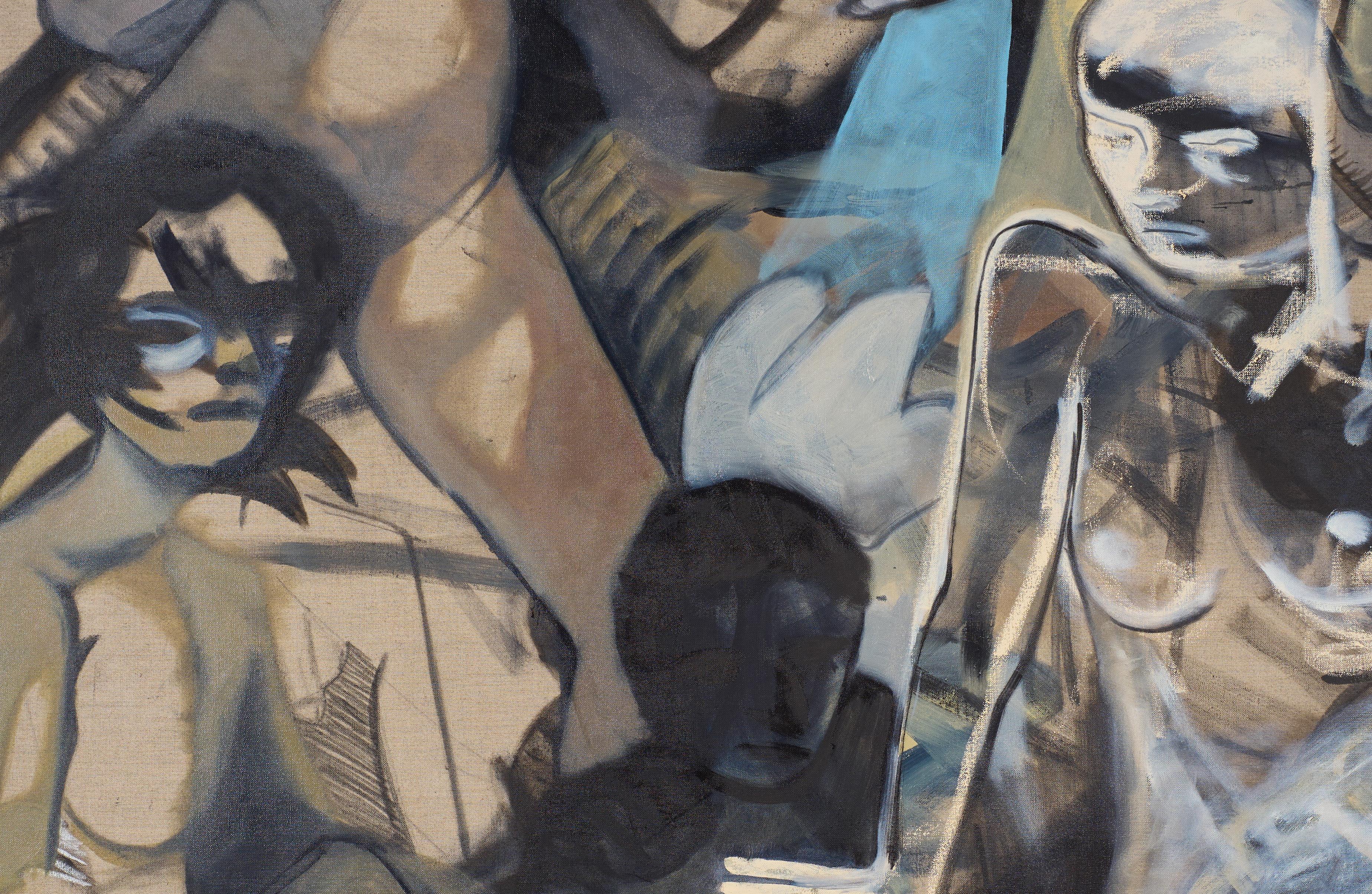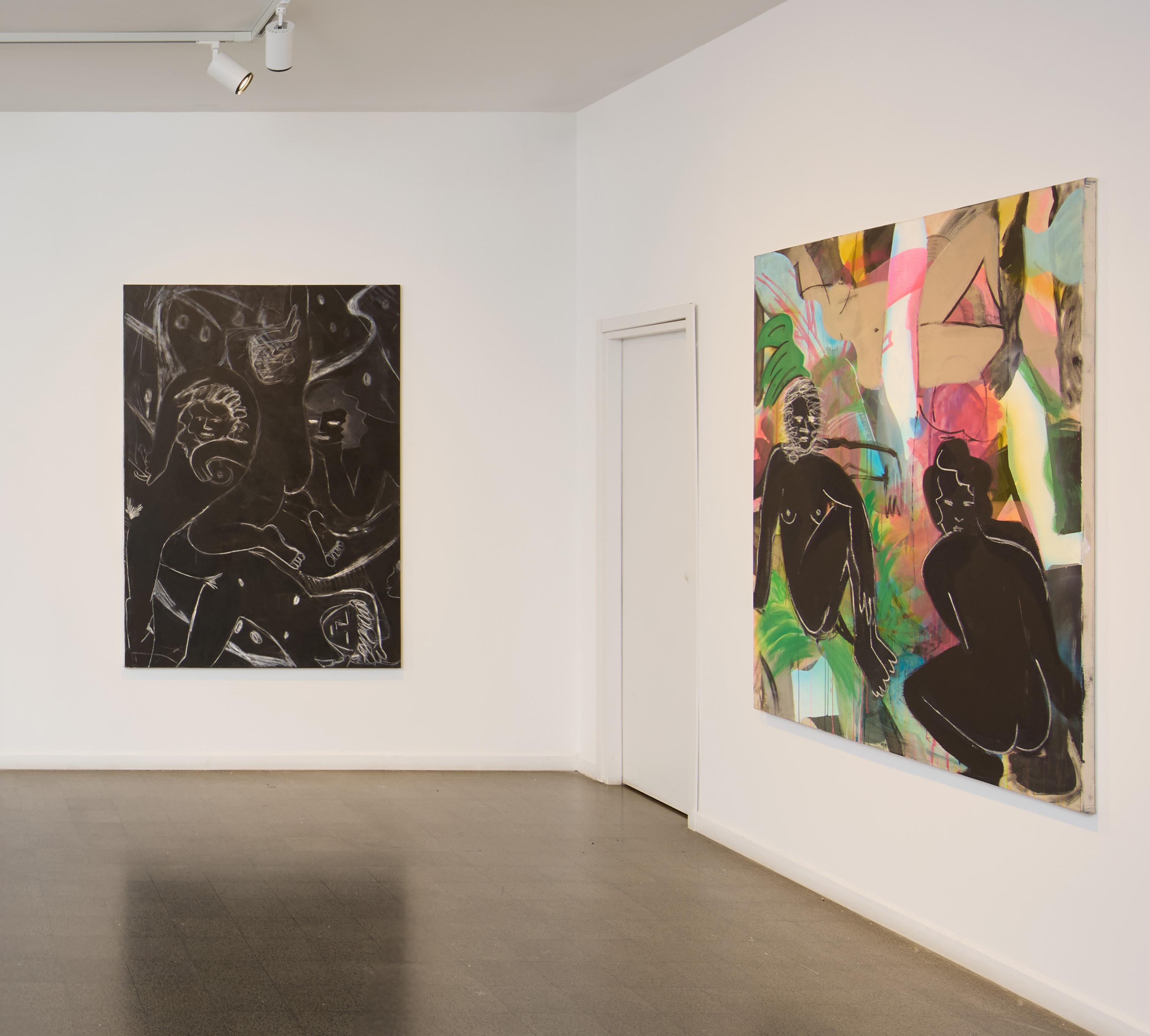




Clinic
Litvak Contemporary, September–November 2024
Sara Benninga, Adi T. Hoffman
Curator: Hadas Glazer
Catalogue editor: Orit Ephrat-Moscovits
Design: Daria Weiser
English translation and Hebrew editing: Maya Shimony
Installation photograghy: Youval Hai
Reproductions photography: Lena Gomon, Shai Halevi
Measurements are given in centimeters – height x length

Litvak Contemporary
Shvil Hamifal 3 Street, Tel Aviv 66535, ISRAEL +972-3-7163897
www.litvakcontemporary.com


Clinic
Featuring: Sara Benninga, Adi T. Hoffman
Curator: Hadas Glazer
The duo exhibition Clinic brings together artists Sara Benninga and Adi T. Hoffman inviting viewers to examine where their works intersect and diverge from one another, as well as the mental and physical processes they embody. Both artists present large and sensual paintings that are rooted in the practice of drawing and address variations and physical interactions. The artistic dialogue echoes a (seemingly) clinical space: A place of diagnosis and treatment, where the body and the mind undergo inspection that breaks them into parts, analyzes them, and then reconstructs them.
The term “clinic,” which is derived from the Greek word kline which means “bed,” refers to a place where medical treatment is carried out, usually while examining and studying physical phenomena in the human body. Today, a clinic is a place of diagnosis, treatment, and healing – a space that is simultaneously critical and compassionate, diagnostic and restorative.
One of the aspects that links the two artists is their use of drawing: In Hoffman and Benninga’s works, drawing is not only a technical step in the creative process, but rather a means for identifying and examining the underlying intention that stands at the core of the painting. Drawing serves as evidence of the link between the body of the artist and the body of the work – the intuitive and fundamental connection between the eye, the hand, and the canvas. It is the armature that holds the work and at the same time establishes the movement that activates the painting. The analysis and understanding of the role of drawing in their paintings and works become an “analytical exploratory tool” with which the deeper layers of the painting can be explored and uncovered.
Adi T. Hoffman examines hybrid amalgamations of the human body, machines, medical devices, and fitness equipment, e.g. tables and beds, skeleton
fragments, vertebrae, and body parts. The body becomes becomes an “experimental field,” where it is adapted, expanded, and sometimes moves away from its natural humanity to accomplish integration with various devices. The presence of drawing in Hoffman’s paintings is palpable in the dominance of the black and intense lines. The wealth of gestures, sensual materiality, and the use of black “patches” attached to the canvas challenge the viewer to rethink the connections between different materials and layers in the painting. Her works echo the ideas that Michel Foucault introduced in his book “The Birth of the Clinic,” about the ways in which the body is turned into an object to be diagnosed and taken apart with scientific and technological means, which ultimately achieve control over the individual patient in the face of illness.
Alongside the paintings, Hoffman presents a sculpture that consists of four black metallic
elements fabricated from scans of charcoal drawings in her sketchbook. The elements reference bones and the spine, but they are completely disjointed and disconnected, challenging the perception of the body’s wholeness. The sculpture turns out to be a three-dimensional drawing, blurring the boundaries between drawing, painting, and sculpture, and stressing the tension between form and negative space.
Sara Benninga takes a different approach to the clinical-analytical concept. She sees painting as a field for examining mental processes, which emerge from the interactions between different figures. These figures, which are sometimes depicted upside down or touching one another, are drawn from a range of sources: some are painted from her imagination directly on the canvas, others are based on life drawings in the studio, and some are contemporary interactions of
historical figures. The figures populate Benninga’s world and reflect a complex internal dialogue, which often remains unsolved. In this exhibition, her paintings range from a dark monochromatic palette to intense fluorescent hues, expressing a type of anarchy and inner yearning. Her analytical approach examines the psyche through the complicated relationships between the figures, creating an emotional and visual tension that spreads across the canvas. Next to the large-scale paintings that portray multiple figures, two small works depict slumbering women in a close-up that leaves only their calm faces. These add a dreamlike atmosphere that ties in with the psychoanalytic undertones, offering another possible perspective on the exhibition as a whole.
The exhibition sets out to empower viewers to act as a doctor/therapist, while introducing questions concerning the relationship between the body, the mind, and the artwork. The connection between the artists weaves an artistic dialogue through the disassembly and reassembly of body and mind, inviting the viewers to carry out an in-depth examination of the works: How does the body react when it is presented as part of a mechanical system? And when it experiences complex interactions? How does the body-machine encounter in the works of Benninga summon questions about the boundaries between the human and the technological? And in what way do the interactions between the figures in Hoffman’s paintings reflect human emotional and mental complexity?





Review of the Systems, 2024














































